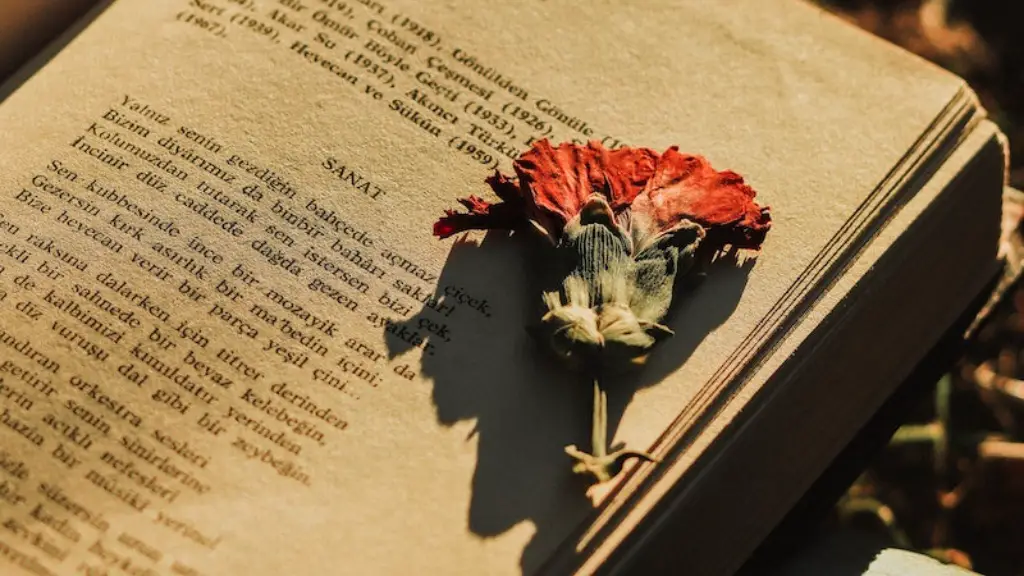How Poetry Helps Mental Illness
Mental illness is an issue that effects all walks of life. It has been estimated that an average of one in four of us may be affected by some form of mental disorder during our lifetime. Research has identified many different strategies for those afflicted to cope with the burdens of mental illness, but for some, turning to poetry can be an invaluable resource for both self-reflection and remedying certain mental health issues.
Poetry as a form of liberation from psychological turmoil has been recognised and utilised for centuries. The ancient Greek philosopher, Aristotle, held that ‘poetry should be prestigious and inspirational’, which could be seen as a reflective description of how poetic expression may benefit a person with mental illness, providing them with a platform of esteem and freedom.
In turn, poetry has been suggested to act as a ‘cognitive form of therapy’ for those with mental illnesses, such as depression and anxiety. Writing poetry is thought to be an effective way of structuring thoughts and helping to organise and articulate our neurological pathways. This structure can guide a person’s reaction to their emotions and the situation at hand, providing an avenue for self-expression on which the individual can thrive.
Therefore, creative expression in the form of writing or oral delivery is deemed to be valuable in helping mental illness victims navigate the traumas and stresses of their day-to-day lives. The act of writing and performing poetry can also facilitate a sense of direct communicatio, connecting them to their inner understanding and providing a deeper understanding of their own mental state and potential resolution.
Furthermore, the creative use of language in poems can provoke feelings of love, empathy and hope, a necessary set of emotions to alleviate symptoms of mental distress. Loosening our mental constraints with poetry can prompt a person to connect and explore their thoughts more freely and mindfully, with imagination and curiosity. This can help to foster a healthy, balanced and thought-provoking outlook on their wellbeing.
Ultimately, poetry provides a person with mental illness a platform to explore the depths of their own trepidation and recovery, in a way that feels safe and secure. It can cultivate a sense that someone is not alone in their situation, that others have been through it before, and this itself can be a liberating process. It is evident, then, that poetry can be an excellent tool for those affected to manage their mental health issues.
A Connection to Heritage and Culture
When connecting to poetry, it’s a good idea to look at the work in a wide context. Poetry is an art form with a long history, and it brings with it a number of associations that can be of great benefit to those with mental health issues. Connecting one’s work to an heritage of poetic knowledge is an excellent way to shift focus away from the individual and their own mental health issues, and instead bring them into a broader cultural context. This can help one to gain a more well-rounded sense of understanding about their condition and their ability to cope.
In addition, many people find that looking to the literary contributions from prominent poets from the past can be of assistance. Not only can this offer comfort and familiarity to the individual, it can also help to tap into a past or present cultural trend, and allow them to connect to their own heritage and identity. Looking to great works can provide the individual with a sense of ambition, and act as an inspiration for them to create their own offerings in the same leisure.
Moreover, connecting to the written word can provide us with a powerful source of broadened meditative information. We experience a sense of collective understanding, providing us with a sense of unity and camaraderie. Finding new ways to refocus energy into one’s work (say, from reading epic poems from over the ages) helps with not only building on our mental capacity, but also helps to heal some of the mental static from everyday life.
This type of poetic therapy offers us multiple ways of approaching the same text, and that is what makes it so valuable for those seeking to heal mental illness. By reading poems written by poets of the past, today’s poets are able to construct a bridge to understanding their own mental hoops and gain a greater understanding of how we can work towards achieving our goals.
Creativity and Expression in Poetry
Poetry is deeply rooted in creative expression, and this aspect can be of great benefit to those in need of self-reflection and release. While mental health issues can bring chaos and a lack of control to a person’s life, poetry can offer a platform to vent their feelings, worries, and fears. Not only this, but writing down their thoughts can also help an individual to work through their troubles in a considered, productive manner.
Creative expression through poetry helps us to engage with our emotions in an open and honest way. It can be viewed as an art form, so the individual can start to view their condition as something that can be painted and shaped. Rather than seeing it as an isolated, irrational problem, the individual can start to bring their thoughts, feelings, and experiences into concrete reality. Poetry can also assist the individual to bring their emotions out of the dark and into the light, in order to help them become more accessible and, ultimately, at ease.
Furthermore, desconstructing feelings and thoughts can often connote a sense of liberation. In this way, the individual is freed from the trappings of their mental distress and instead gain a feeling of resolution. This can come from casting imagined thoughts as words, as well as from the performing of poetry for an audience, which provides an avenue for connection to the world at large, and allows the individual to express themselves beyond the realm of their mental illness.
Poetry can be integral in helping the individual to pinpoint the source of their ailment and work towards examination and resolution. Through creative expression and the engagement of a wider community, the individual gains the reassurance and understanding needed to rewrite life in a healthy and prosperous manner.
Making it Last: Sustaining the Impact of Poetry
In order to make sure that the effects of poetry are long-lasting in a person’s mental wellbeing, it is important to keep a few things in mind throughout the creative and therapeutic processes. Firstly, it is crucial to be aware of our environment and the context within which we compose and perform the work. This could include the time, the people around us, and the type of material we are writing. It’s important to feel comfortable and free during the act of writing and curation.
It is important to remain consistent, approaching the poetic process routinely so that it can become an integral part of our daily lives. Whether it’s writing a few lines in the morning or haiku in the evening, it is important to acknowledge our efforts and build our practice routine. This way, we can more easily come back to our expression and explore its depths at a later time.
Additionally, it is essential to make sure to take care of ourselves in order to maximise the impact of poetry. Eating well, exercising regularly, and taking the necessary time to rest and relax are integral aspects of a healthy life and should be maintained in order to sustain a positive foundation of wellness. Aligning our minds with our bodies should broaden the impact of poetry in our lives.
Finally, it is important to remember to reach out. As many mental illnesses are rooted in isolation, it is crucial to engage in meaningful relationships with others. This can help us to deepen our understanding of our condition and encourage us to focus on what is important to us in life. We should strive to engage with new concepts and exchange ideas, openness, and connection within our communities.
Petforms and Unexpected Application
In addition to this, poetry can also be beneficial to those with mental health issues through its variety of forms. From rap and spoken word to free verse and haiku, each style of delivery can help to bridge differences between one’s understanding and recognition of what is going on in their life and the potential directions to take. All of these styles provide unique vehicles of expression, and may allow us to access moments of clarity and understanding that at times might have been harder to reach.
Moreover, poetry can offer a non-traditional form of therapeutic activity. Because it is able to cross cultural boundaries, it has found its way into a myriad of new and diverse creative outlets. It can be applied to art, film, drama, dance and other creative outlets, imbuing them with unique emotional depth. Furthermore, its use in technology and social media also increases its reach and its potential to bridge both digital and physical connectivity to its users.
In addition, understanding the effect of our words on others can assist us in developing an understanding of the power of communication. Combining mindfulness with communication and language can aid the individual to understand themselves from an outside perspective, increasing their engagement in the world and with others. As a result, we can start to seek deeper connections over shallow ones, and value our own, as well as others’, emotional perspectives.
Understanding this, we can begin to understand how something as simple as words can have a powerful help those in need. Through its living and evolving nature, poetry has an immense ability to aid mental health issues, providing creative expression, insight and healing.
Finding Meaning and Connection With the World
Ultimately, poetry can bring us closer to understanding the world, and thus closer to understanding and healing our own mental health. Through its unique form of expression and its act as an escape from our trauma and distress, poetry can allow us to momentarily disconnect from our worries and allow ourselves to see ourselves and the world around us in another light.
In this way, we can gain a greater insight into our own condition. We can start to explore our mental capacity through the use of poetic language, and by understanding not only our own limitations but also our capabilities to break free from them. This can help us to develop a firm sense of connection to the world around us and to the people within it.
In this way, we can gain the confidence and support needed to confront the traumas and stresses of our mental health issues. Through understanding and ultimate acceptance, we can start to move forward and recognise our strength in the face of adversity.
Taking Ownership of the Journey
In the end, no two journeys in the face of mental health are the same. Poetry can provide us with a platform to understand, express, and explore our mental capacity and condition and use it to encourage healing and development. By noting our efforts and, most importantly, by taking ownership of our development, we can start to build something that can be continued for years to come. In this way, poetry retains its power as an effective tool in this time of personal breakthrough and growth.
Connection and understanding are key components to any recovery process and so by encouraging these two aspects in ourselves through poetry, we can open up a world of potential and possibility. In this way, we can even find unexpected solace and beauty in our battle against mental illness, and escape the stigma that may have been previously attached.
It is evident, then, that poetry is an invaluable resource to those struggling with mental health issues. From its creative expression to its cultural and immediate relevancy, poetry is able to provide a number of unique cognitive, social, and emotional benefits that help us to brave difficult subjects, like mental health. Therefore, it is important that we continue to explore the many ways in which poetry can help us open up, express, and heal.





